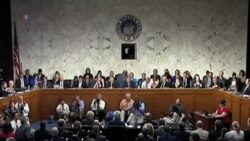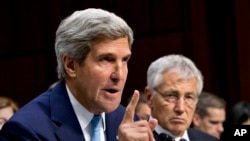CAPITOL HILL —
The Obama administration has intensified pressure on U.S. lawmakers to authorize the use of force against the Syrian regime for the apparent nerve gas attack less than two weeks ago that caused devastating civilian casualties. Some members of Congress are deeply skeptical about the consequences of a limited strike against Syria, but the exhaustive lobbying effort appears to be yielding results.
At the White House and on Capitol Hill, the administration made its case Tuesday for military action against the Syrian regime. Appearing before the Senate Foreign Relations Committee, Secretary of State John Kerry spoke bluntly about the use of chemical weapons:
“It did happen, and the Assad regime did it," said Kerry.
Kerry warned against inaction.
“If you are [Syrian President Bashar al] Assad, or if you are any one of the despots in that region, and the United States steps back from this moment, together with our other allies and friends, what is the message? The message is that he has been granted impunity," he said.
Anti-intervention protesters repeatedly interrupted the hearing.
Senate Foreign Relations Committee chairman Robert Menendez acknowledged Americans are war-weary, but said the United States cannot stand by idly.
“We will either send a message to Syria, Iran, North Korea, Hezbollah, al-Qaida and any other non-state actors that the world will not tolerate the senseless use of chemical weapons by anyone. Or we will choose to stand silent in the face of horrific human suffering," said Menendez.
Several senators want strict limits on U.S. military actions in Syria, including Republican Bob Corker:
“I do not think there are any of us here who are willing to support the possibility of having combat boots on the ground," said Corker.
Kerry assured him there would be no U.S. ground forces intervening in Syria’s civil war. But he argued for some flexibility in the event of escalated use of weapons of mass destruction in Syria - or the transfer of those weapons to groups hostile to the United States.
Other lawmakers questioned what a limited military strike against the regime of Syrian President Bashar al-Assad will accomplish. Republican Senator James Risch put forth a troubling scenario.
“If we go in with a limited strike, and the day after, the week after, or the month after, Assad crawls out of his rat hole and says, ‘Look, I stood up to the strongest power on the face of this earth - and I won’," said Risch.
Kerry argued there is no way U.S. strikes would strengthen the Syrian leader. In fact, he said, the mere threat of force is already accelerating desertions among Assad-backers.
Polls show low levels of U.S. public support for intervention in Syria, something highlighted by Republican Senator Rand Paul.
“I have not had one person come up to me and say they are for this war. Not one person," said Paul.
U.S. officials say use of force in Syria would not constitute a full-scale war. Speaking at the White House earlier in the day, President Barack Obama sought to draw a distinction between focused military strikes in Syria and the long, open-ended campaigns of America’s recent past, saying, “This is not Iraq and this is not Afghanistan.”
House Speaker John Boehner emerged from a White House meeting voicing support for the use of force in Syria. Congressional votes are expected early next week.
At the White House and on Capitol Hill, the administration made its case Tuesday for military action against the Syrian regime. Appearing before the Senate Foreign Relations Committee, Secretary of State John Kerry spoke bluntly about the use of chemical weapons:
“It did happen, and the Assad regime did it," said Kerry.
Kerry warned against inaction.
“If you are [Syrian President Bashar al] Assad, or if you are any one of the despots in that region, and the United States steps back from this moment, together with our other allies and friends, what is the message? The message is that he has been granted impunity," he said.
Anti-intervention protesters repeatedly interrupted the hearing.
Senate Foreign Relations Committee chairman Robert Menendez acknowledged Americans are war-weary, but said the United States cannot stand by idly.
“We will either send a message to Syria, Iran, North Korea, Hezbollah, al-Qaida and any other non-state actors that the world will not tolerate the senseless use of chemical weapons by anyone. Or we will choose to stand silent in the face of horrific human suffering," said Menendez.
Several senators want strict limits on U.S. military actions in Syria, including Republican Bob Corker:
“I do not think there are any of us here who are willing to support the possibility of having combat boots on the ground," said Corker.
Kerry assured him there would be no U.S. ground forces intervening in Syria’s civil war. But he argued for some flexibility in the event of escalated use of weapons of mass destruction in Syria - or the transfer of those weapons to groups hostile to the United States.
Other lawmakers questioned what a limited military strike against the regime of Syrian President Bashar al-Assad will accomplish. Republican Senator James Risch put forth a troubling scenario.
“If we go in with a limited strike, and the day after, the week after, or the month after, Assad crawls out of his rat hole and says, ‘Look, I stood up to the strongest power on the face of this earth - and I won’," said Risch.
Kerry argued there is no way U.S. strikes would strengthen the Syrian leader. In fact, he said, the mere threat of force is already accelerating desertions among Assad-backers.
Polls show low levels of U.S. public support for intervention in Syria, something highlighted by Republican Senator Rand Paul.
“I have not had one person come up to me and say they are for this war. Not one person," said Paul.
U.S. officials say use of force in Syria would not constitute a full-scale war. Speaking at the White House earlier in the day, President Barack Obama sought to draw a distinction between focused military strikes in Syria and the long, open-ended campaigns of America’s recent past, saying, “This is not Iraq and this is not Afghanistan.”
House Speaker John Boehner emerged from a White House meeting voicing support for the use of force in Syria. Congressional votes are expected early next week.






